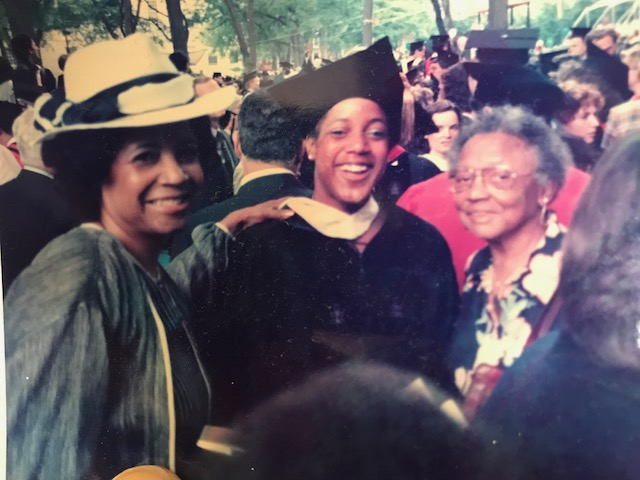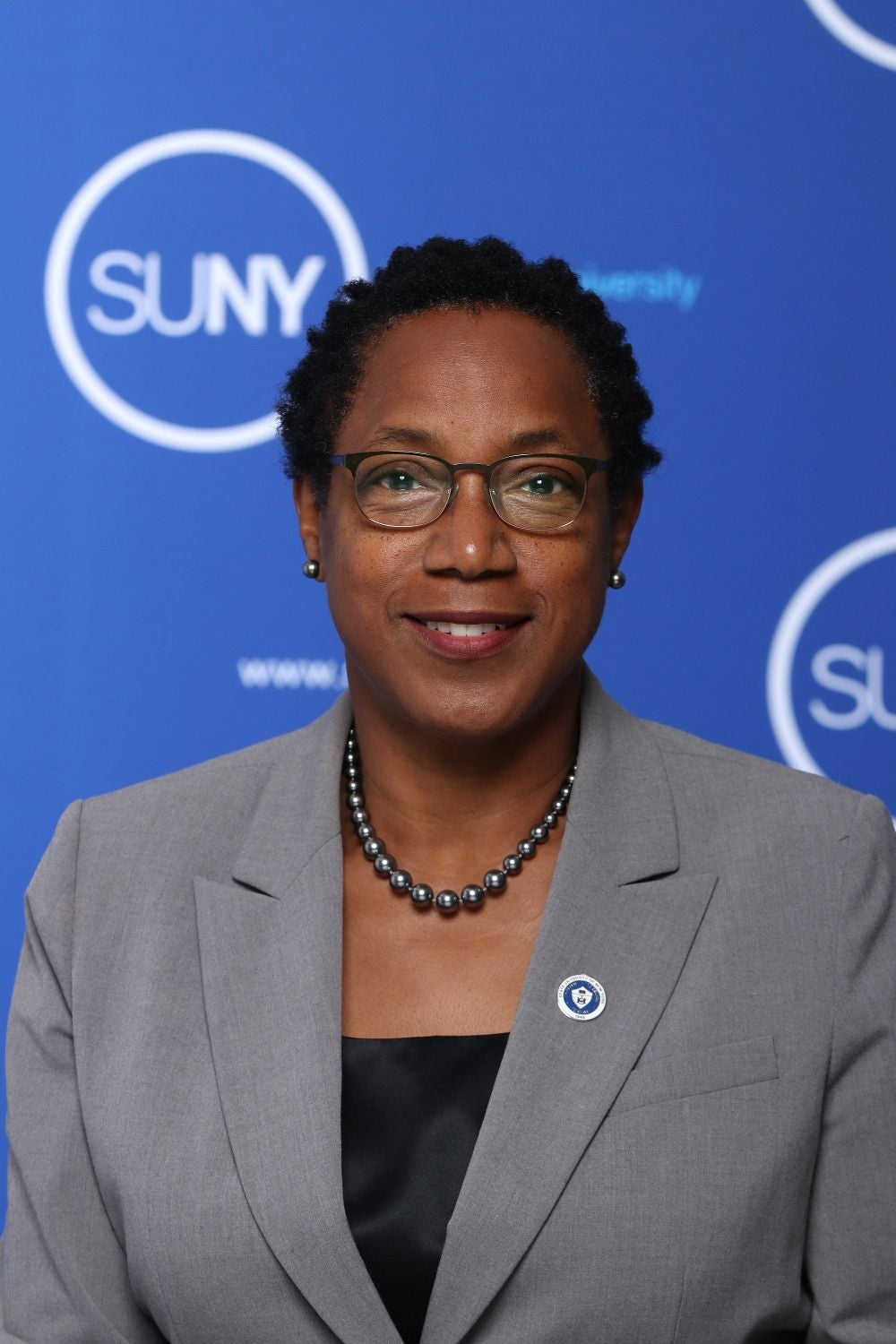Teresa A. Miller, HLS Class of 1986 and known to many as “Teri,” passed away on Aug. 6, 2021, in New York City, surrounded by her closest loved ones. She personified grace, justice, and joy, and her extensive accomplishments speak not only to the scope of her person, but also to her drive to apply her legal training to wide-ranging realms of human endeavor, encompassing teaching, writing, legal reform, film production, and, if indirectly, even opera.
A pioneer in defining diversity in higher education as inseparable from the pursuit of academic excellence, Miller served most recently as senior vice chancellor for strategic affairs at the State University of New York, as well as chief diversity officer. Her leadership infused the entire 64-campus university system, and she represented SUNY at the inauguration of Harvard’s President Bacow in 2018. Miller had also served as officer-in-charge of SUNY’s Old Westbury campus during a transition between presidents in 2020-2021, overseeing all aspects of campus life, including COVID-19 management. At the time of her death, SUNY Chancellor Jim Malatras and Board of Trustees Chair Merryl Tisch said: “Teri has been a steadfast leader at SUNY for over two decades, building more awareness to the needs of our underrepresented students and creating a robust environment that encompasses goals of excellence, equity, and inclusion. …We know that her lessons will continue to be part of the very fabric of this institution and celebrated for years to come. … We will cherish the extraordinary life and exceptional contributions of a generational talent.”
She personified grace, justice, and joy
Teresa Miller was born in Fort Benning, Georgia, on Feb. 20, 1962, the daughter of Billy Gene Miller, a U.S. Air Force pilot and officer, and Dr. Henrietta Thomas Dabney, who held numerous teaching and administrative positions at Norfolk State University, culminating in her being named professor emerita in sociology. Miller’s life tracked closely with the indignities and victories of America’s civil rights struggle, and she created a well of courage and insight from interviewing her parents, and especially her grandmother, Helen Clark Thomas, who with her husband, P. Floyd Thomas, developed Thomas Villa and other neighborhoods for Black residents in Hampton, Virginia, in the face of persistent racial discrimination. While Black workers of all socioeconomic sectors were being regularly turned down for mortgages and home ownership by most realtors and bankers in the area, the Thomas properties filled the gap and enabled Black families to buy homes and live in a welcoming environment.
Miller spent most of her early life in the Hampton area, graduating from Booker T. Washington High School, still racially segregated de facto, where she was a champion swimmer and high diver, leading to her lifelong devotion to the sea, especially sailing. She entered Duke University as an Angier Biddle Duke Scholar, serving as yearbook editor and earning her bachelor’s degree in psychology. After graduating from Harvard, she taught legal research and writing at the University of Miami School of Law and served as judicial law clerk to Judge William Hoeveler of the U.S. Southern District. Miller also earned a Master of Laws degree at the University of Wisconsin as a William H. Hastie Fellow.

Miller joined the faculty of the University of Buffalo Law School in 1995, where she became a tenured professor of law, specializing in immigration law, criminal procedure, and prisoner law. Miller published widely and served on the American Bar Association task force that rewrote the Standards on the Legal Status of Prisoners (2010). She also traveled throughout New York state evaluating conditions at state prisons on behalf of the Correctional Association of New York.
As her work unfolded, Miller became increasingly concerned about the unfinished business of the civil rights era in contemporary academic life. She was named the University of Buffalo’s inaugural vice provost for equity and inclusion. She catalyzed the groundbreaking “Difficult Conversations” project (DIFCON), a platform that brought students, faculty, and staff together to explore controversial questions, including racial and social inequity. DIFCON intended to encourage the campus to “lean into discomfort,” as described on the website, yet in an atmosphere of reconciliation and respect.
Word of Miller’s creativity and skill in combining progressive vision with practical outcomes spread, and in 2018 then newly appointed SUNY Chancellor Kristina Johnson recruited Miller to join the central university administration system, first as the chancellor’s chief of staff, and later in the broader roles of senior vice chancellor and chief diversity officer.
At SUNY, Miller lost no time applying her campus experience at Buffalo to the entire SUNY system, focusing on the persistent and underlying need to increase diversity among the faculty as a pivotal element in expanding the social and intellectual benefits of diversity overall.
Perhaps Miller’s crowning achievement at SUNY was her conceptualization and leadership of the innovative PRODiG program (Promoting Recruitment, Opportunity, Diversity, Inclusion, and Growth) aimed at increasing faculty diversity and refreshing campus hiring practices, the first such multifaceted program of its scale in the nation. When the program was launched in March 2019, then-Lieutenant Governor and now Governor of New York Kathy Hochul said: “We are committed to breaking barriers when it comes to those who are underrepresented in their professions, particularly in the STEM fields. This initiative is another step toward our goal of achieving equality for all New Yorkers, from college to careers and all aspects of everyday life.”
At the time of her death, Miller was hoping to launch another campuswide initiative to revitalize the premise of academic freedom and academic community in the face of rising extremism and censorship of speech.
Miller’s passion for education was matched by her love of design and the visual arts, and this duality was in constant evidence in her academic work.
A gifted photographer who had once dreamed of a professional photo career, Miller invited her students to use filmmaking as a tool for study and inquiry, producing with them among other works “Encountering Attica.” The film followed a group of Miller’s first-year students as they interviewed and interacted with inmates at New York’s maximum security Attica Correctional Facility.
Drawing on this experience, Miller was instrumental in helping the Glimmerglass Festival based in Cooperstown, New York, create and implement its landmark program of opera performances at Attica. The program not only brought the beauty and poignancy of opera inside to inmates and staff, but also helped open eyes to the idea that humanity resides in every individual, even within obdurate prison walls. The Glimmerglass Attica program received national media coverage.
Miller’s role in expanding the mission and reach of the Glimmerglass Festival was such that the company dedicated its final performance of the 2021 summer season to Miller’s memory. The piece was the opera “The Passion of Mary Cardwell Dawson,” the story of the dedicated musicologist and voice teacher who founded the National Negro Opera Company in 1941, the first African American opera company. Dawson, born in 1894, herself a gifted singer whose performance career was stillborn by racism, explicitly sought to train Black opera singers and cultivate Black audiences for opera, in spite of the refusals and hatreds of the Jim Crow era. The role of Dawson was performed by the premier mezzo-soprano Denyce Graves, whose warm-toned emotion carried her final lines well beyond the stage. “Remember me, remember me — we are free,” Graves sang to her budding vocal students as the opera ended, a haunting recall of Teresa Miller’s own life and intergenerational devotion.
Miller herself had a tour de force only a few months before her death at the 2021 SUNY commemoration of Martin Luther King Jr.’s birth. Miller relished her mentoring role and, able to reach the whole SUNY system via Zoom, she took the occasion to refresh the meaning of King’s life and leadership in today’s volatile times. She spoke directly to the vast student audience who might, as she said, “think of Dr. King as merely this noble moralist whose name is invoked to quash the readiness of young people to take to the streets to make their voices heard. You may hear ‘nonviolence resistance’ as ‘cool your jets’ or ‘go back to class and get your education first.’”
She put King’s efforts in the context of her own life, as a child growing up during King’s leadership, saying: “I lived in a world in which I was an oddity — a Black officer’s child. My sister and brother and I lived under a microscope. Like the King children, we were always expected to be well-behaved and presentable. Not for the sake of poshness or vanity, but because we represented the promise of ‘the Negro race’ to the white world. … For me, as a child growing up in the South, Dr. King and his family represented the dignity and discipline that would win over the white race and open opportunities for all our people. I had to do my homework so that in school, I could be smart on behalf of all Black people. I spoke the Queen’s English to be well-spoken on behalf of all Black people. I bore all kinds of indignations — being called the N-word, being unjustly accused of stealing, being targeted on the playground — and refrained from getting into fights with white children, so that my conduct would not reduce all Black people to the uncivilized heathens most white people suspected we were, just beneath the surface.”
Miller highlighted King’s radicalism that might have been lesser known, such as his advocacy of labor and economic reform, and said that even at the height of his public profile and as he continued to embrace nonviolence, to the mainstream he remained one of America’s most unpopular public figures because his views and objectives were so threatening to the status quo.
And yet, she said, “The beloved community, King opined, is made possible when men and women can live together as brothers and sisters in a community, and not continually live with bitterness and friction.” Miller concluded by quoting from a commencement speech Dr. King delivered at the University of the West Indies in 1965, “Facing the Challenge of a New Age”: “‘But the end is reconciliation. … It is this type of spirit and this type of love that can transform opponents into friends. It is this type of understanding goodwill that will transform the deep gloom of the old age into the exuberant gladness of the new age. It is this love which will bring about miracles in the hearts of men.’”
Amen, said Miller, bridging time with the timelessness of her inspiration, synthesizing vision and nobility.
